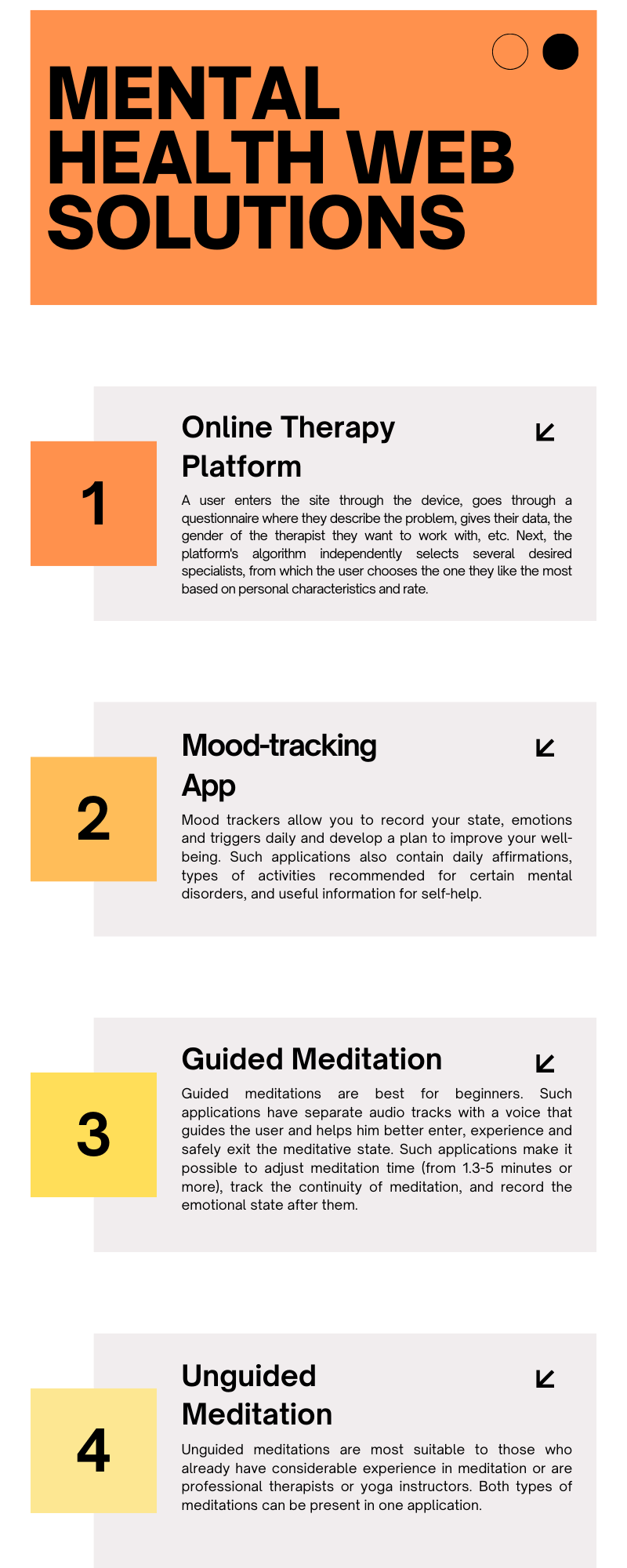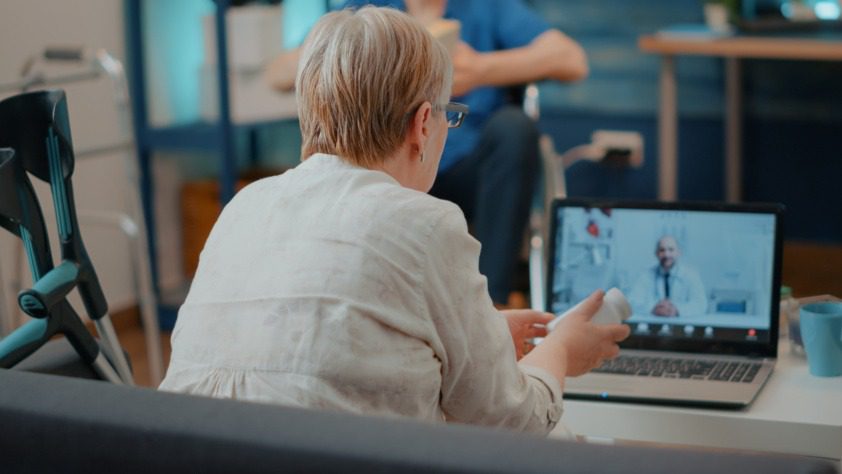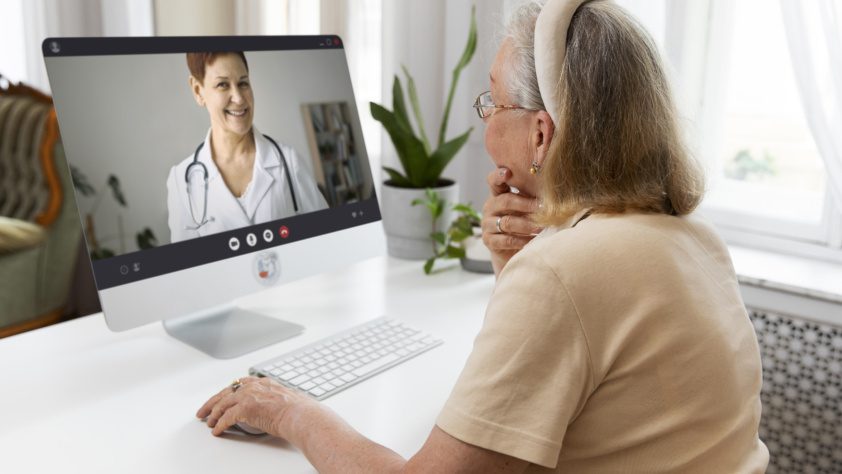Mental health awareness refers to ongoing efforts to reduce the stigma surrounding mental illness and disorders by spreading useful information. These usually include stories about mental conditions from people’s own experiences, scientific research, articles that debunk myths about mental disorders, and the promotion of mental health care, which includes counseling and psychotherapy. Talking about mental health has also gained popularity since one in four will experience psychological problems in their lifetime, and almost a billion people in the world are now living with various types of mental disorders: anxiety, bipolar disorder, PTSD, and more.
Online services of specialists who can provide help at any convenient time for the client play a significant role in improving the psychological state of people. Platforms with psychological help, online training, and courses are as much in demand as web-based telemedicine solutions. According to the study, Intention to use digital mental health solutions, approximately 20-25% of students in the US are interested in paid mental health services, while 70-72% of students are interested in free web-based solutions.
What solutions can the digital space offer to facilitate the care and treatment of mental disorders and what are the types of web projects? The answer is in our new blog post.
A Guide to Mental Health Apps: Types and Tools for Mental Wellbeing

Depending on the requests and wishes, several types of platforms address mental health issues. First of all, there are online therapy platforms for psychological help.
In this platform, a user enters the site through the device, goes through a questionnaire where they describe the problem, gives their data, the gender of the therapist they want to work with, etc. Next, the platform’s algorithm independently selects several desired specialists, from which the user chooses the one they like the most based on personal characteristics and rate. Next, a schedule is set for the therapist and the client, and video conferences are held. Video recordings, if conducted, are available only to the patient and the specialist, so as not to violate the confidentiality of the therapy. For conducting online therapy, experts advise finding a private place where a user will not be disturbed and adjusting the camera angle and lighting.
Another type of app we’ll talk about here is mood-tracking apps. These are additional tools for tracking one’s mental state, which helps to create an overall picture of a person’s psyche. They can serve as part of the main therapy or as a separate tool for self-development. Depending on the specification, mood trackers are made for those with anxiety, depression, PTSD, and other disorders.
Mood trackers allow you to record your state, emotions and triggers daily and develop a plan to improve your well-being. Such applications also contain daily affirmations, types of activities recommended for certain mental disorders, and useful information for self-help. Applications are usually created for smartphones and other portable devices so that the user can constantly monitor his psycho-emotional state.
Last, one of the most popular types of mental health web apps is the meditation app. Depending on the direction and audience, there are applications for different types of meditation: guided meditation, unguided meditation, meditation while moving, and visualization.
As for the first type, guided meditations are best for beginners. Such applications have separate audio tracks with a voice that guides the user and helps him better enter, experience and safely exit the meditative state. Such applications make it possible to adjust the time of meditation (from 1.3-5 minutes or more), track the continuity of meditation, and record the emotional state after them. Sometimes guided meditations may contain extraneous sounds for additional soothing (flow of water, rain, fire, etc.).
Unguided meditations are most suitable to those who already have considerable experience in meditation or are professional therapists or yoga instructors.
Both types of meditations can be present in one application. The program of meditations for movement is created for those who meditate and at the same time carry out a certain physical practice. For example, during a walk, gardening, drawing, etc.
The last type of meditation is visualization. This type of meditation was created not to observe thoughts and calm the mind, but to create an internal picture in which the user is during the entire meditation.
How Mental Health Apps Enhance Therapy and Self-Care
Web solutions for mental health support have long found their response among clients and are actively used by professional specialists because they provide a considerable number of advantages:
- simplification of interaction between specialists and clients. Thanks to video conferences, the patient can receive psychological help with faster access, without prior appointments, and immediately from home. Thus, the specialist can even assess the native environment of a patient, which can also indicate his current mental state.
- simplified search for the right specialist. Web platforms allow users to find the right specialist faster thanks to an algorithm that automatically calculates the selection of the right therapists. Using the web platform, the patient no longer needs to independently search for information about the accreditation and qualifications of a specialist – the platform itself can find the right psychologist or psychotherapist with all the necessary data.
- increasing the availability of psychotherapeutic help. With modern technologies, qualified psychological help is available not only to residents of large cities but also to small towns and villages. Thus, information about mental health care has a wider distribution area and more and more people are learning about which information about mental conditions is myth and which is truth.
- the ability to constantly monitor your mental state. With the aforementioned mood trackers, people with anxiety or depression have more opportunities to monitor their own moods and record triggers by recording data in the application. This is a more advanced and convenient option than writing down your thoughts and emotions in a diary, for example.
Web platforms and applications have long been used in spreading useful information about mental health and qualified psychological assistance. Because people have less misinformation about certain mental conditions, and more tools available to help manage, if not cure, those conditions. People who have easier access to the services of psychotherapists have more options to improve their quality of life by solving psychological problems through therapy. Online meditations allow not only to calm the mind but also to increase concentration and work efficiency. Mood trackers, which patients can use throughout the day, help track their condition throughout the day and make it easier to track triggers.
So, when you hire a mental health web development company, you not only make your services available and stay competitive. Owners of web solutions also provide their help to those people who need it in a world where many people have a lot of psychological disorders.


